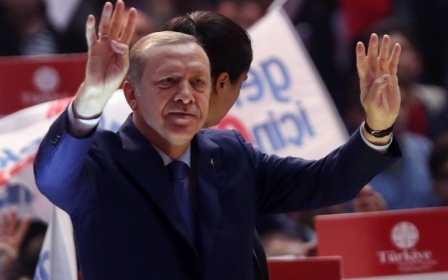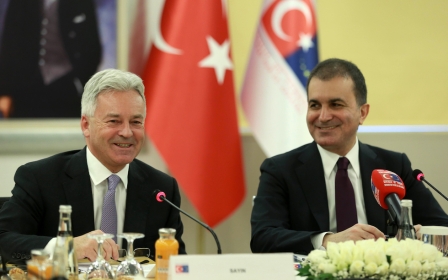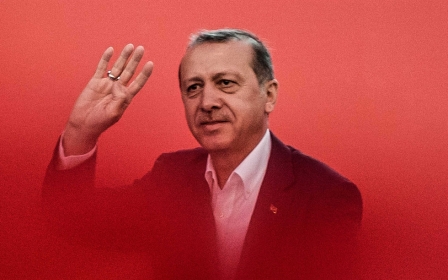Referendum polls 'neck and neck' says leading Turkish pollster
Public opinion on Turkey's upcoming constitutional referendum is still "neck and neck" said one of the country's leading pollsters, with many supporters of the ruling Justice and Development party (AKP) undecided.
In an interview with the Turkish opposition newspaper Hurriyet, Bekir Agirdir, the general director of polling company Konda, said that despite political "polarisation" in Turkey over the 16 April referendum - which is set to grant new powers to President Recep Tayyip Erdogan - many natural supporters of the government were still not fully swayed by the Yes camp.
"The majority of the undecided are among the constituency of the ruling AKP and the [Nationalist Movement Party] MHP," he explained, referring to the far-right political party whose leadership have been Erdogan's allies in the Yes camp. "One fifth of the AKP voters remain unconvinced of the changes. A quarter of the MHP’s voters are undecided and more than half of the MHP’s voters are in the No camp."
"Regarding the referendum, today we are not at a point where one side or the other can say confidently: 'This is it, we are way ahead.' The race is still neck and neck."Support for the constitutional changes, which among other reforms could see Erdogan remain in power to 2029 and even beyond, has fluctuated greatly in recent months.
Nationalists divided
The split in the MHP, led by charismatic dissident parliamentarian Meral Aksener, has been seen as the major threat to the Yes campaign, as it risks dividing the Turkish nationalist camp that had been seen as the Yes campaign's natural supporters.
However, a recent diplomatic spat with the Netherlands and Germany over permission for Turkish ministers to campaign in the countries in order to shore up the Yes vote among the five million or so Turkish diaspora in Europe, is seen by some commentators as potentially shoring up support for the government.
In addition, the Turkish government has criticised European countries for allowing alleged supporters of the outlawed Kurdistan Workers' Party (PKK) to stage demonstrations in their cities while denying government ministers the ability to do the same.
Agirdir said that all these things, combined with threats to hold a further referendum on whether to continue Turkey's EU bid, could stand to stoke up nationalistic sentiment in the country.
"Conditions that create the perception of an [existential] threat to the country, or the need for a strong force, serve the government," he said.
Kurdish vote split
He also explained that, while supporters of the pro-Kurdish, leftist People's Democracy Party (HDP) were staunchly in the No camp, among the Kurdish community as a whole - many of whom have historically supported the AKP - there were still many undecided voters.
"You can traditionally divide Kurdish votes into those who are for or against the system or the dominant power," said Agirdir.
"It’s roughly a 50-50 divide. You can also divide Kurdish voters in two in terms of whether they are religiously conservative or more secular. That’s also around 50-50."
Last week, the European parliament announced that it would not be sending a delegation to observe the referendum, despite concerns about the suppression of critical media in the country and ongoing violence in the southeast.
"The European Parliament will not send a delegation to observe this referendum and will consequently not pronounce itself on the process nor on the results that will be announced," the parliament said in a statement.
However, the Organisation for Security and Cooperation in Europe (OSCE) said it had accepted an official invitation from the Turkish government to deploy a Limited Referendum Observation Mission to monitor the referendum.
During its previous mission to monitor the November 2015 elections in Turkey, called after the failure to create a coalition government after the indecisive June 2015 elections, the OSCE was critical of the conditions under which the elections took place and suggested that a rise in violence and media suppression had “hindered contestants ability to campaign freely".
Middle East Eye propose une couverture et une analyse indépendantes et incomparables du Moyen-Orient, de l’Afrique du Nord et d’autres régions du monde. Pour en savoir plus sur la reprise de ce contenu et les frais qui s’appliquent, veuillez remplir ce formulaire [en anglais]. Pour en savoir plus sur MEE, cliquez ici [en anglais].





